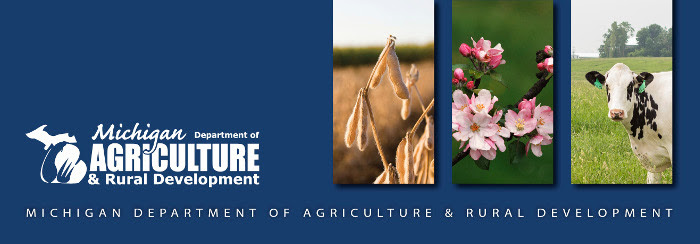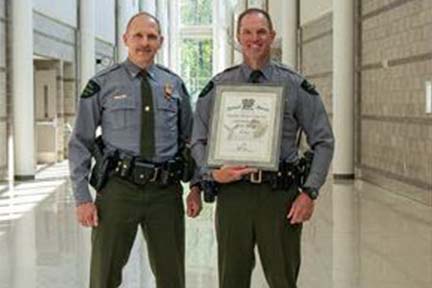
Securing Federal Commitment to Protect Great Lakes Economy

FOR IMMEDIATE RELEASE
May 9, 2025 Contact: press@michigan.gov
Gov. Whitmer Statement After Securing Massive Federal Commitment to Protect Great Lakes Economy President takes executive action to recommit federal support for Brandon Road Interbasin Project that will protect Great Lakes, Midwest economy weeks after Governor advocated for it in White House meeting
LANSING, Mich. – Today, Governor Gretchen Whitmer released a statement after President Donald Trump signed a memorandum in support of the Brandon Road Interbasin Project (“Brandon Road”). The president’s action comes just weeks after the governor raised the issue with him in Oval Office meetings. Michigan is funding half of the 10% non-federal cost share of the project, together with the State of Illinois, with the U.S. Army Corps of Engineers leading on construction. The transformational effort will help stop invasive carp from moving into the Great Lakes, protecting Michigan’s maritime economy. Brandon Road has been a top Michigan priority for over 20 years, and after a long process and relentless advocacy, it is finally getting done.
Governor Whitmer Statement “Today, Michigan scored another huge win that will protect our Great Lakes and secure our economy. After years of advocacy alongside our partners in Illinois and together with a wide range of stakeholders at the local, state, and federal levels, we now have renewed assurances from the Administration to move forward expeditiously on the Brandon Road Interbasin Project. I am grateful to the President for his commitment.
“This game-changing project, built at a critical water junction, will protect the Great Lakes from invasive species of carp. These fish, if allowed to enter the lakes, would destroy the ecosystem below the water and devastate our economy above it. The Great Lakes are home to 3,500 plant and animal species and they support 1.5 million jobs that generate than $60 billion in wages a year across the entire region.
“That’s why I went to Washington, DC to advocate for this project face-to-face with the President at the White House. I am grateful that, in the midst of a lot of change at the federal level, he is confirming that our federal partners are as committed as ever to getting this done. It’s especially great to have yet another huge win with our U.S. Department of Defense on the heels of securing a new fighter mission last month at Selfridge Air National Guard Base in Macomb County.
“Michigan continues to win because we show up, talk to anyone, and work together to get things done.”
Brandon Road Background The Brandon Road Interbasin Project will implement a complex series of invasive carp and aquatic nuisance species deterrents. Located near Joliet, Illinois, it will sit at a critical pinch point to stop invasive carp from moving into the Great Lakes. Silver carp feed on plankton, a primary food for many native fish including walleye, yellow perch, and lake whitefish. They are voracious eaters, consuming up to 40% of their weight per day, and can reach up to 60 pounds, with each female producing up to one million eggs. In the Great Lakes, the silver carp would be likely to populate nearshore areas and large rivers, which would devastate sport and commercial fishing, threatening the $7 billion fishing industry in the Great Lakes. These fish also violently jump out of the water when startled, even resulting in injury to humans, and would harm the boating, tourism, and maritime economy. Silver carp have been reported in 12 states surrounding the Mississippi and Ohio River basins. Michigan has been working with the U.S. Army Corps of Engineers, Illinois, and other Great Lakes states since 2011 to get this done. Important milestones along the way include:
The project is supported by a large bipartisan coalition, including local, state, and federal officials on both sides of the aisle, conservation and environmental advocacy groups, hunters and anglers, tourism, maritime and boating advocates, and regional Great Lakes intergovernmental groups. The project has specifically been a top priority of the inter-state and international Great Lakes St. Lawrence Governors and Premiers, currently chaired by Governor Whitmer.
Protecting the Great Lakes & Water Michigan is home to 21% of the world’s fresh water. Since taking office, Governor Whitmer has taken action to protect the Great Lakes and Michigan’s tourism industry, both of which are critical to the state’s economy, history, and way of life. She signed game-changing clean energy legislation to enact a 100% clean energy standard by 2040 and protect Michigan’s precious natural resources. She established and funded the MI Clean Water plan, an over $4.6 billion investment to protect the Great Lakes from pollution and help communities across the state upgrade their water infrastructure. Michigan also continues to enforce the strongest Lead and Copper Rule for drinking water in the country and established health-based standards for PFAS in drinking water supplies. |







 Michigan Department of Natural Resources Conservation Officer Justin Ulberg has been named the 2024 Shikar Safari Michigan Wildlife Officer of the Year.
Michigan Department of Natural Resources Conservation Officer Justin Ulberg has been named the 2024 Shikar Safari Michigan Wildlife Officer of the Year.
